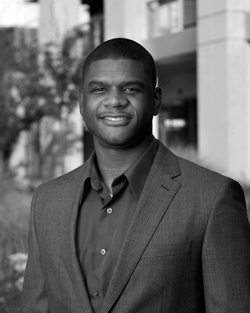
Cyberspace has not only created a boon of opportunity for individuals, businesses and governments, but also for cyber criminals. Recognizing the need to develop a strong education system and workforce in cybersecurity, the U.S. Federal Government established the CyberCorps: Scholarships for Service program. A partnership between the National Science Foundation (NSF) and the Department of Homeland Security (DHS) CyberCorps: Scholarships For Service (SFS) provides tuition scholarships for undergraduate, graduate and doctoral students in cybersecurity, and after graduation, job placements in cybersecurity positions in Federal, State, Local or Tribal Government organizations for a period equal to the length of their scholarship.
Recently we met Devon Rollins, a cybersecurity professional in Washington, D.C. and 2008 CyberCorps SFS Fellow. He was happy to share his experience as a CyberCorps Fellow.
1. What inspired you to apply for the CyberCorps SFS Fellowship?
As a graduating senior at North Carolina Agricultural and Technical State University in Computer Science, I was oscillating between the immediate prospects of the workforce and the attractiveness of higher education. Having studied the gamut of computer science concepts I felt particularly drawn to computer forensics and incident response, a testament to the Encyclopedia Brown books I found myself enamored with as a child. Judging by the undergraduate curriculums of the foremost schools in the field, I estimated that a more immersive, specialized experience was necessary for me to truly consider myself competent. However, the realities of growing up in a working class family and the inability to retain an athletic scholarship through graduate school meant entertaining my professional ambitions earlier than intended. Graduate school, for a glimpse in time, became a dream deferred, only to be paired with corporate training funds and managerial concurrence.
Luckily, through the diligence of professors who wanted me to stay, I was introduced to the CyberCorps SFS Fellowship which would pay for me to pursue my graduate studies at a partner school, provide me a stipend, and assist with job placement in exchange for a commitment to work for in public service for two years afterwards. It was a mutually beneficial opportunity that served both my interest in cyber security and civic engagement.
2. What is a typical week like for a CyberCorps Fellow?
For a CyberCorps SFS fellow in the workforce, the duties vary but acquiesce around making the Internet, government networks, and the digital experience for Americans much safer. We all contribute to this cause and find much pleasure in promoting a worthy agenda bigger than ourselves. Most of our work is classified, but the aim of our mission is widely promoted.
As a fellow, you may develop software, interrogate hard drives, develop cyber policy, or conduct research. Each day is met with the task of becoming more informed about the field of study and advocating for others to become good digital citizens. We inch towards making the Internet safer, making networks more secure, and assisting the government in securely using technology to best serve the American public.
3. What tips would you give others applying to the fellowship?
Be clear and thoughtful about the need for interdisciplinary approaches to combating the online threats this country faces. In general, you should showcase how exposure to public service will inform your knowledge of cyber related issues. And as always, captivate your audience with a well thought out plan of how you intend to use this fellowship and be a steward of its principles.
Devon Rollins is a Senior Information Systems Engineer at MITRE Corporation specializing in cyber and investigative technologies and a current Center for American Progress Leadership Institute Fellow. Devon has received advanced degrees in Computer Science and Information Security Policy and Management from North Carolina Agricultural and Technical State University and Carnegie Mellon University respectively. He is also a former Gem Fellow (2010) and National Consortium for Graduate Degrees for Minorities in Engineering and Science Fellow (2011).
© Victoria Johnson 2014, all rights reserved.